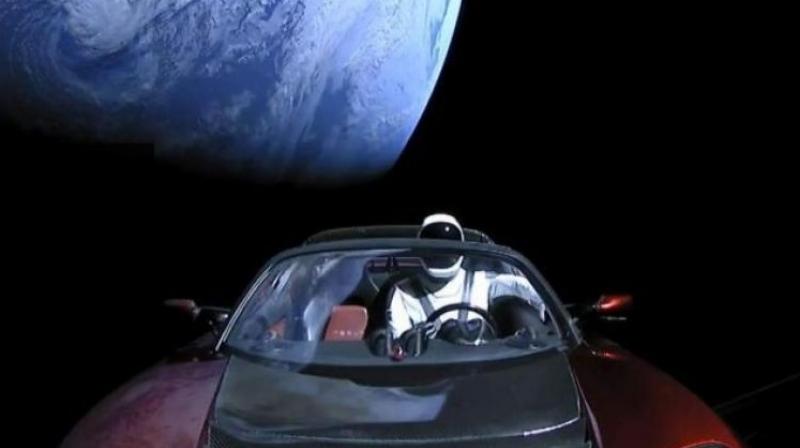Are we all alone in the Universe, or are we not?
It presents the travails of human Arthur Dent, at whose house councilmen have arrived for a demolishment.

It is a thoroughly seductive image: a cherry-red Tesla Roadster, with a space-suited mannequin in the driving seat, gloved hand on the steering wheel, in the darkness of space, with the Earth reflected on the vehicle’s glossy paint. A car, a battery-operated electric sports vehicle, sent to orbit the sun, hopefully near Mars, for perhaps hundreds of millions of years (though some party poopers believe that it will disintegrate within a year or so); that is the stuff of dreams for sci-fi fans, especially those with a sense of humour. For, to make things better, the car carries the words “Don’t panic” on the dashboard, and on its sound system is playing David Bowie’s “Space oddity”. Also in the vehicle is a data storage unit containing the sci-fi works of Isaac Asimov and the Foundation trilogy, argued by many as being amongst the most influential works in the genre of the current age. This was the payload of SpaceX’s “Falcon Heavy”, now the world’s most powerful rocket, that blasted off on its maiden flight from Cape Canaveral on Wednesday.
This could be taken as a measure of the romance that the idea of space travel still offers for millions around the planet, a future where “shuffling off these mortal coils” may be able to be given a new meaning altogether. Many news organisations have reported the words “Don’t panic” on the Tesla’s dashboard in “an apparent nod to” the Hitch-hiker’s Guide to the Galaxy, Douglas Adams’ ground-breaking 1978 work of fiction that spiralled into something much more than what it had been envisioned as. In fact, Elon Musk, CEO of SpaceX, has said often that it was the Hitch-hiker that changed his life as a young boy, and that gave him the drive to try to develop a private space exploration company. When, after years of failure, the “Falcon Heavy” went off last week, Musk mused about extra-terrestrial life and the possible discovery at some point of the Tesla: “Maybe it will be discovered by some future alien race,” he told reporters. “What were these guys doing? Did they worship this car?” The Hitch-hiker’s Guide to the Galaxy started life as a comedy radio broadcast on BBC 4, and then grew (amongst many other guises) into a phenomenally successful series of books (“A trilogy in four parts”, eventually five, and even later six, the last written by author Eoin Colfer). It presents the travails of human Arthur Dent, at whose house councilmen have arrived for a demolishment. Within the first few pages, he is to find out that it is not just his house but in fact the entire planet that is to be demolished by order of an alien race, in order to make space for a bypass. Dent is saved from extinction by his friend Arthur Prefect, who turns out not to be human after all, and thus finds his way to the running-shoe shaped spaceship “Heart of Gold” (which is the name SpaceX plans to give to its first intended Mars-colonising ships).
Here is how Adams describes Earth: “Far out in the uncharted backwaters of the unfashionable end of the western spiral arm of the galaxy lies a small, unregarded yellow sun. Orbiting this at a distance of roughly ninety-two million miles is an utterly insignificant little blue-green planet whose ape-descended life forms are so amazingly primitive that they still think digital watches are a pretty neat idea” (keep in mind that this was written four decades ago). The detractors of the “Falcon Heavy” argue that there is no justification for a billionaire to indulge himself with something like this project while here on Earth, war, famine, sickness, and unceasing deprivation are the daily lot of so many millions. Look at Syria, Iraq, Palestine — indeed, Pakistan — goes the argument. And there is no doubt merit to this. And yet. And yet. Arthur C. Clarke famously commented that, “Two possibilities exist: Either we are alone in the universe or we are not. Both are equally terrifying.” How beguiling to be one tiny step closer to finding out.
By arrangement with Dawn

